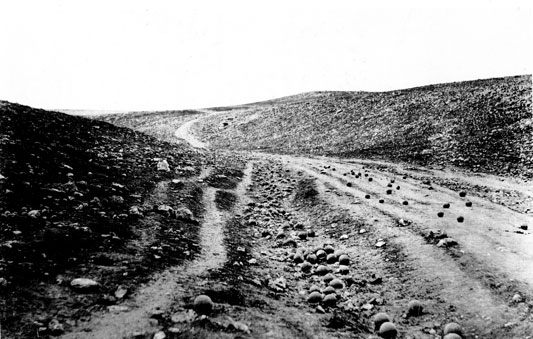
The three part Errol Morris series on the 1855 Fenton photographs of the "Valley of the Shadow of Death" wrapped up a couple of days ago, with a lengthy and definitive conclusion: parts one, two, and three. (I very briefly summarized the basic question Morris is interested in here)
What's interesting about this from a literary critical perspective is the way Morris struggles against what might be a kind of documentarians' version of the "intentional fallacy" in attempting to discern the ordering of the two photos. Beyond anything else, he really wants to find formal, empirical evidence -- from the photographs themselves -- that would prove definitively which photo was taken first.
Morris talks to numerous "forensic photography" experts along the way, and while each one adds a certain amount of technical data relating to lighting and contrast (which might possibly indicate time of day), only one of the experts can actually discover the visual clue that finally puts the question to rest. But even as the experts contribute technical information, they can't help but speculate on Fenton's motives. Questions about what the photographer might have been thinking or aiming for always seem to enter back into the picture: for instance, did he put the cannonballs in the road to make himself as a photographer look more heroic, or simply because it would show the balls in greater contrast? In that sense "experts" are in the same analytic space as Susan Sontag, the critic/theorist whose original interpretive (and one might say, speculative) comments on the Fenton photographs started Morris down this long road to begin with. They may have access to information Sontag didn't have, but they are still, at the end of the day, just interpreters.
In other words, thinking about the photographer's intention may be a "fallacy" in the sense that it can never prove anything empirically, but it's a practice engaged in by nearly everyone Morris talks to. Morris himself is the only one who comes close to being immune to it -- he inoculates himself against his interlocutors' speculations with frequent editorial comments on their reasoning.